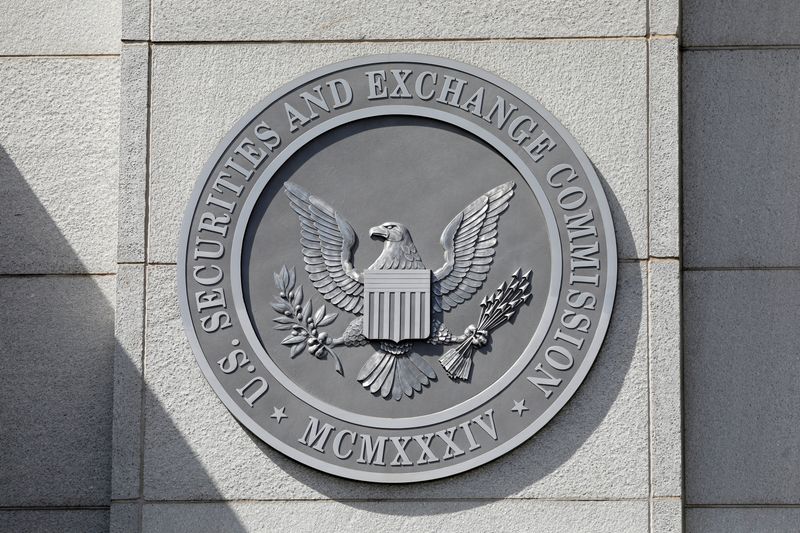US SEC seeks to appeal Ripple Labs crypto decision By Reuters
[ad_1]

© Reuters. FILE PHOTO: The seal of the U.S. Securities and Exchange Commission (SEC) is seen at their headquarters in Washington, D.C., U.S., May 12, 2021. REUTERS/Andrew Kelly/File Photo
(This Aug. 9 story has been corrected to show that a judge found the SEC had a plausible claim that the USD token qualified as a security in paragraph 8)
By Jonathan Stempel
NEW YORK (Reuters) – The U.S. Securities and Exchange Commission plans to appeal a recent court decision involving Labs that was a setback for the agency’s efforts to oversee cryptocurrency markets.
In a letter on Wednesday, the SEC asked U.S. District Judge Analisa Torres in Manhattan to let a federal appeals court review her July 13 decision, in which she said the sale of Ripple’s XRP digital token on public exchanges complied with federal securities laws.
The SEC said an appeal could address legal issues on which there was “substantial ground for differences of opinion.”
It also said the outcome of an appeal had “particular consequence” for its ability to enforce securities laws, and for a “large number” of other lawsuits.
The SEC has for years claimed that digital assets such as cryptocurrency are securities, as are stocks and bonds, and that it has power to regulate them.
It sued Ripple, Chief Executive Brad Garlinghouse, and co-founder and Chairman Chris Larsen in December 2020, accusing them of illegally raising more than $1.3 billion in an unregistered securities offering by selling XRP.
Torres said Ripple did not break the law when the XRP token was sold on public exchanges, because purchasers had no reasonable expectation of profit based on Ripple’s efforts.
Eighteen days later, however, U.S. District Judge Jed Rakoff, who sits on the same court, ruled the opposite way in finding that the SEC had a “plausible claim” that the Terra USD token offered by Terraform Labs qualified as a security when sold on public exchanges.
Torres’ decision was not a total victory for Ripple, as she found that it violated securities laws by selling XRP to institutional investors.
The judge must decide whether to let the SEC appeal her decision, and put the case on hold.
Ripple, and lawyers for Ripple, Garlinghouse and Larsen did not immediately respond to requests for comment.
Chaired by Gary Gensler, the SEC has brought more than 100 enforcement actions related to cryptocurrency, though many ended in settlements.
Gensler has also tried to rein in speculative excesses in the cryptocurrency sector, which he has said undermine investor trust in U.S. capital markets.
The Ripple and Terraform cases do not directly affect the SEC lawsuit accusing Coinbase (NASDAQ:), the largest U.S. cryptocurrency platform, of operating illegally because it failed to register as an exchange.
Binance, the world’s largest cryptocurrency platform, is also being sued by the SEC.
[ad_2]
Source link

© Reuters. FILE PHOTO: The seal of the U.S. Securities and Exchange Commission (SEC) is seen at their headquarters in Washington, D.C., U.S., May 12, 2021. REUTERS/Andrew Kelly/File Photo
(This Aug. 9 story has been corrected to show that a judge found the SEC had a plausible claim that the USD token qualified as a security in paragraph 8)
By Jonathan Stempel
NEW YORK (Reuters) – The U.S. Securities and Exchange Commission plans to appeal a recent court decision involving Labs that was a setback for the agency’s efforts to oversee cryptocurrency markets.
In a letter on Wednesday, the SEC asked U.S. District Judge Analisa Torres in Manhattan to let a federal appeals court review her July 13 decision, in which she said the sale of Ripple’s XRP digital token on public exchanges complied with federal securities laws.
The SEC said an appeal could address legal issues on which there was “substantial ground for differences of opinion.”
It also said the outcome of an appeal had “particular consequence” for its ability to enforce securities laws, and for a “large number” of other lawsuits.
The SEC has for years claimed that digital assets such as cryptocurrency are securities, as are stocks and bonds, and that it has power to regulate them.
It sued Ripple, Chief Executive Brad Garlinghouse, and co-founder and Chairman Chris Larsen in December 2020, accusing them of illegally raising more than $1.3 billion in an unregistered securities offering by selling XRP.
Torres said Ripple did not break the law when the XRP token was sold on public exchanges, because purchasers had no reasonable expectation of profit based on Ripple’s efforts.
Eighteen days later, however, U.S. District Judge Jed Rakoff, who sits on the same court, ruled the opposite way in finding that the SEC had a “plausible claim” that the Terra USD token offered by Terraform Labs qualified as a security when sold on public exchanges.
Torres’ decision was not a total victory for Ripple, as she found that it violated securities laws by selling XRP to institutional investors.
The judge must decide whether to let the SEC appeal her decision, and put the case on hold.
Ripple, and lawyers for Ripple, Garlinghouse and Larsen did not immediately respond to requests for comment.
Chaired by Gary Gensler, the SEC has brought more than 100 enforcement actions related to cryptocurrency, though many ended in settlements.
Gensler has also tried to rein in speculative excesses in the cryptocurrency sector, which he has said undermine investor trust in U.S. capital markets.
The Ripple and Terraform cases do not directly affect the SEC lawsuit accusing Coinbase (NASDAQ:), the largest U.S. cryptocurrency platform, of operating illegally because it failed to register as an exchange.
Binance, the world’s largest cryptocurrency platform, is also being sued by the SEC.